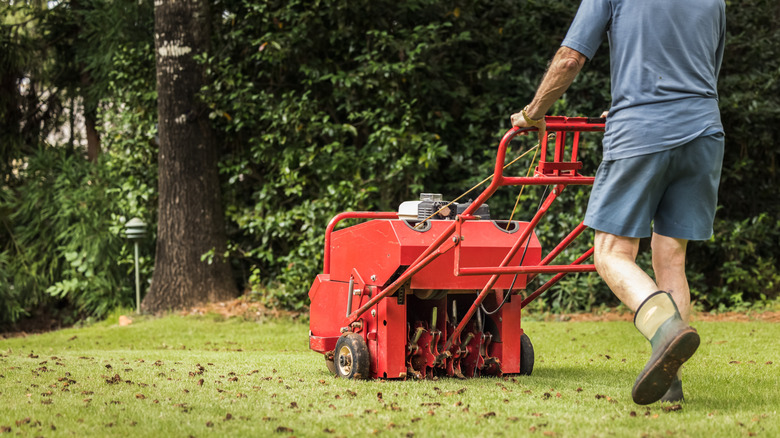Here's What A Yard Full Of Dandelions Means About Your Lawn's Condition
You may find weeds in your lawn to be a nuisance, but the truth is they often serve an important purpose. Weeds can tell you a lot about the condition of your soil. Like all plants, different weeds have different preferences for soil and growing conditions, and which ones are growing in your lawn can tell you a lot about the health of the soil beneath it. If you happen to have a lawn full of dandelions (Taraxacum officinale), you probably have compacted soil.
If you think about weeds as a solution to a problem, and not the problem itself, you can completely transform your relationship with your lawn. If you've ever tried to pull a dandelion, you know they have long taproots. These roots can actually help break up your compacted soil, and that is exactly what they are trying to do. They can also be seen as a response to lawns that are lacking calcium. Crabgrass (Digitaria sanguinalis) also tends to appear in soil that lacks nutrients and calcium, so if these two are growing side by side, you may have a pretty good idea of what's going on beneath the surface. Your weeds are a reaction to an ecosystem that is out of balance. So, the trick to solving your dandelion problem for good may not be herbicide, but improving the soil conditions — and dandelions can help.
Dealing with the soil conditions that lead to dandelions
Dandelions' long tap roots are helping to break up compacted soil that is often a result of high foot or vehicle traffic, excessive tilling, or even just a result of clay soil. Calcium deficiency often means your soil is acidic. Whatever the cause, left alone, dandelions can fix these problems. They are considered to be a calcium pump. Those long taproots reach way down into the soil to access calcium and bring it to the surface in the form of its leaves and flowers. If you then mow and don't bag your clippings, the leaves will break down and provide calcium to the top soil. Of course, letting dandelions do the work they were designed to do takes time.
If you don't want to wait, you can use some tips to save your lawn from issues caused by compacted soil. Aerating your soil is one of the quicker routes to improving compacted ground. Adding compost to your lawn will also attract organisms that naturally aerate your soil. Combining these approaches will help build a more resilient yard.
If you have acidic, calcium-deficient soil, you can add lime to your lawn help balance the pH. Additionally, applying composted leaves from native trees and crushed egg shells can help. This will have the added benefit of attracting organisms to break up your soil, so it's worth considering.

